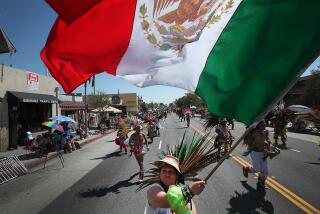A Cause for Real Celebration at German-American Karnival
- Share via
The 600 members of the German American Societies of San Diego find themselves with more to celebrate today at their annual Karnival than they had planned on.
This year’s Karnival--a festival of music, dance and German food that traditionally starts at 11 a.m. on the 11th day of the 11th month--will be remembered as the one at which the county’s German-Americans rejoiced over the opening of the Berlin Wall.
On Friday, society members were showing up at their lodge to talk about what the news meant to them and their friends and families. Christa Mitzkat(, a retired travel agent from Santee, left her family behind in central Germany and escaped with her husband to the West in 1952. With her 61-year-old brother, Klaus, and his wife Brigitte still living in East Berlin, Mitzkat never thought she would hear Thursday’s news.
“Of course, I was so excited I called my brother and sister-in-law,” she said at the German American Societies’ El Cajon headquarters. “My sister-in-law said, ‘It’s wonderful, we now can travel.’ They are all very happy, but most important they feel the freedom comes when they can finally openly talk and voice their opinion.”
In September, Mitzkat, who settled in Bloomington, Ill., before moving to San Diego 10 years ago, visited East Berlin and once again felt the government’s iron fist. In her brother’s apartment near the Berlin Wall, they closed the windows before they would talk. “You never knew if someone was listening who would turn them in later on for whatever negative things they might have said.”
Years of enforced caution have made her relatives still wary of the new events.
“They are still very cautious and they still think, ‘let’s just wait and see.’ It’s a shock for everyone. In 1965, my brother (in East Berlin) was not allowed to go to the funeral of our mother when she died in West Berlin,” Mitzkat said.
But her relatives are too settled to now move and face the pressures of being new emigrants, she said.
“When you’re an older person, where are you going to go to and what are you going to do in the West? How will you take care of yourself financially? They (Klaus and Brigitte) have built up their lives there. They had to put up with what they had to. It just isn’t feasible to leave.”
Mitzkat’s 30-year-old niece, an East Berlin schoolteacher with a husband and two children, also will stay.
“They have their income in East Berlin. And, if they can’t get bananas, well, they will live without. But they decided, for the time being, they are staying,” she said. “If you’ve been lied to for 40 years, you can’t just overnight build up enough trust to believe everything the government says is true,” Mitzkat said.
Herb Meeder’s relatives in West Germany have watched the East Germans arriving in droves over the past fews weeks and admit they are worried about what the open border policy might bring.
Meeder, a 54-year-old El Cajon insurance agent who left West Germany in 1962, said most of his family remained in Germany. His sisters, brothers and mother are concerned about West Germany’s economic future with the influx of East Germany refugees, he said. They wonder how their country’s housing market and social welfare programs will handle the thousands of newcomers.
“I think these are secondary concerns,” he said. “Germany has proven once before, in the late ‘40s and early ‘50s, they can absorb large numbers of refugees under far worse conditions. Their concerns are shortsighted and selfish. All of these people are in their 30s bringing young children, which is what West Germany needs because their population is declining.”
More to Read
Sign up for Essential California
The most important California stories and recommendations in your inbox every morning.
You may occasionally receive promotional content from the Los Angeles Times.








